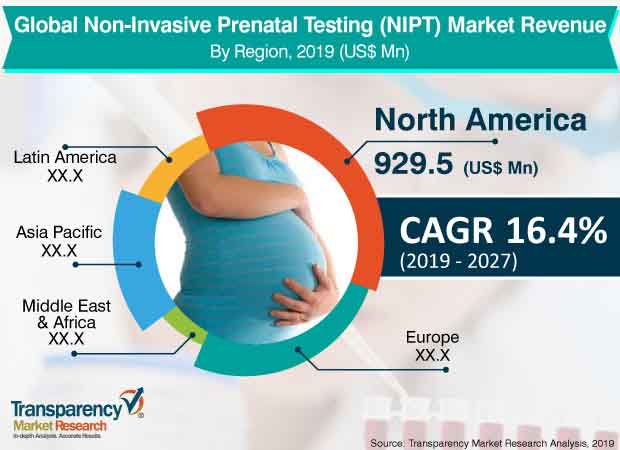- Transparency Market Research (TMR) has published a new report titled, “Non-Invasive Prenatal Testing Market – Global Industry Analysis, Size, Share, Growth, Trends, and Forecast, 2019–2027”.According to the report, the global non-invasive prenatal testing market was valued at US$ 1300 Mn in 2018. It is projected to expand at a CAGR of 16% from 2019 to 2027.
- Increasing cases of Downs’ syndrome, rising maternal age, and increasing demand for early and non-invasive fetal testing procedures are anticipated to boost the global non-invasive prenatal testing market from 2019 to 2027.
- Stringent regulatory guidelines, limitations of non-invasive prenatal testing, and availabilities of other alternatives would likely to hamper the growth of the global non-invasive prenatal testing market in the future.
- On the other, emerging non-invasive prenatal testing will prove an opportunity to the global non-invasive prenatal testing market in the upcoming future.
- North America is expected to dominate the global non-invasive prenatal testing market in the next few years, while the non-invasive prenatal testing market in Asia Pacific is likely to propel at a significant growth rate in the near future.
Materni21 segment to hold prominent market share
- Based on test type, the global non-invasive prenatal testing market has been classified into Materni21, Harmony, Panorama, Verifi, NIFTY, and others.
- The MaterniT21 segment accounted for a significant share of the global non-invasive prenatal testing market in 2018. The segment is estimated to remain highly lucrative during the forecast period.
- In the U.S,, Sequenom (which was presently a part of Labcorp) introduced MateriT21 in 2011, which was the first NIPT solution in the U.S. MaterniT21 is able to identify trisomies and expanded tests may also explain sex chromosomes disabilities and some microdeletions. Less percentage error is a significant advantage of MaterniT21.
- In addition to MaternitT21, the Panorama segment held a notable share of the global non-invasive prenatal testing market, in terms of volume, in 2018.
Trisomy segment to expand at rapid pace
- In terms of application, the global non-invasive prenatal testing market has been classified into Trisomy, Microdeletions Symptoms, and others (Sex Chromosomes Disorders).
- The trisomy segment is anticipated to expand at a notable CAGR in the near future. According to the CDC, Down’s syndrome is considered to be a common chromosomal disorder in the U.S.
- Around 6,000 babies (1 in 700 babies) are born with Down’s syndrome in the U.S., each year, and a rise in the cases of Down’s syndrome has fueled concerns among healthcare practitioners in the U.S.
- Increasing new cases of Down’s syndrome among live births in the U.S. is a leading factor attributed to the notable share held by the trisomy segment of the global non-invasive prenatal testing market in 2018.
NGS (next generation sequencing) segment to hold notable share
- Based on technology, the global non-invasive prenatal testing market has been classified into NGS (next generation sequencing), WGS (whole genome sequencing), and others.
- The NGS (next generation sequencing) segment accounted for a major share of the global non-invasive prenatal testing market. The segment is anticipated to exhibit a notable attractiveness index in the near future.
Diagnostic laboratories segment to expand rapidly
- Based on end-user, the global non-invasive prenatal testing market has been divided into hospitals, diagnostic laboratories, and others.
- The diagnostic laboratories segment is anticipated to expand at a significant growth rate during the forecast period, due to the emerging healthcare infrastructure in the diagnostic laboratories as compared to hospitals.
North America to account for prominent market share
- In terms of revenue, North America dominated the global non-invasive prenatal testing market in 2018.
- Higher rate of adoption of non-invasive prenatal testing, rising cases of Down’s syndrome, strong healthcare infrastructure, and presence of key companies are likely to drive the non-invasive prenatal testing market in North America.

Request PDF Brochure of the Report @ https://www.transparencymarketresearch.com/sample/sample.php?flag=B&rep_id=374
Market dominated by Laboratory Corporation of America Holdings and Roche
- The report also provides profiles of leading players operating in the global non-invasive prenatal testing market. Product launch, strategic alliances, product promotions are the competitive business strategies for the major companies in order to sustain the global non-invasive prenatal testing market during the forecast period.
- Berry Genetics, BGI, Laboratory Corporation of America Holdings, Agilent Technologies, Inc., Illumina, Inc, F. Hoffmann-La Roche Ltd, NATERA, INC., PerkinElmer Inc, Eurofins LifeCodexx AG, and IGENOMIX are major players operating in the global non-invasive prenatal testing market, offering products with proprietary technologies.
- In February 2018, the India-based subsidiary of IGENOMIX transferred to a new big laboratory. The laboratory was also equipped with highly advanced instruments for gene sequencing, Ion S5 NGS systems, by Thermofisher.
- In June 2017, LifeCodexx AG announced that the company entered to a partnership with Lifecell to introduce rapid and economic noninvasive DNA testing (PrenaTest qNIPT) in India. qNIPT, which identifies the presence of fetal trisomy 21 from maternal blood, received CE-IVD marking in December 2016.
- For instance, in July 2018, Berry Genetics partnered with 10X Genomics to upgrade non-invasive DNA prenatal testing. This collaboration was the first step for 10X Genomics to enter into the market in China.
- Additionally, in July 2016, Laboratory Corporation announced the acquisition of Sequenom for US$ 371 Mn, including debt. With this acquisition, Laboratory Corporation would strengthen its presence outside the U.S., in Europe and Asia Pacific, and enable it to provide top quality non-invasive prenatal testing services